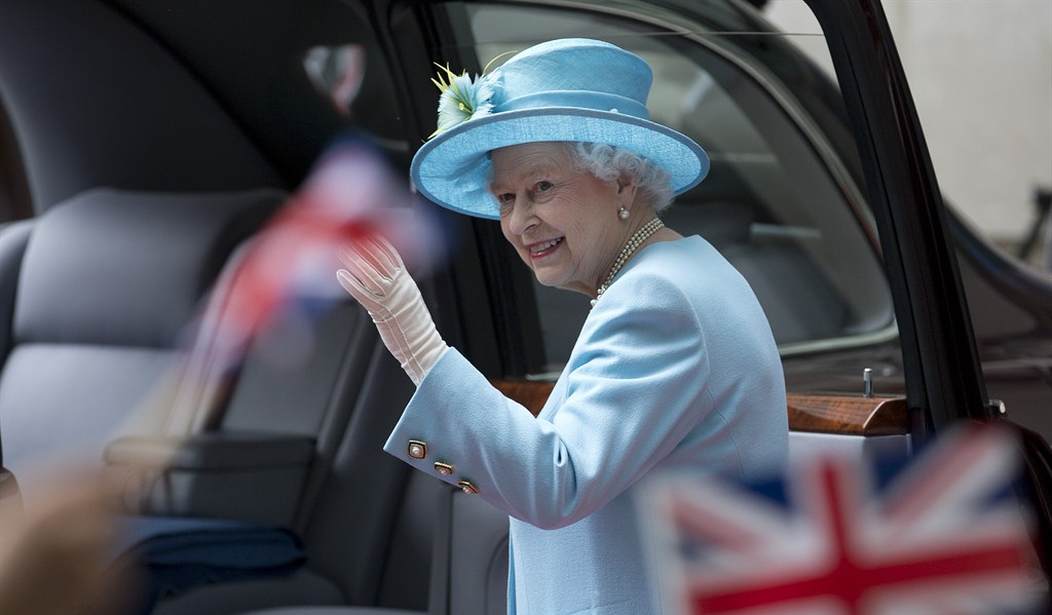God save our gracious Queen
Long live our noble Queen
God save the Queen
Send her victorious
Happy and glorious
Long to reign over us
God save the Queen
Sixty years. Sixty years on the throne of the United Kingdom. Can the little Englishwoman entering Westminster Abbey all in white, including the almost 19th century lady's hat, a big black matron's bag slung over a begloved arm, be the same young queen who tremblingly took the throne 60 years ago?
Yes, she's the same Elizabeth Alexandra Mary Windsor who acceded to the throne in 1952 but now, victorious and glorious in a whole different way, she celebrates her Diamond Jubilee as the head of a kingdom and empire that has changed too, yet somehow remains unalterably the same.
Sixty years. Oh, the troubles she's seen. ... You have to wonder, looking back, if you've been watching a royal saga or a British soap opera. Why not both? Between her scandal-prone family, the Irish Troubles that never seemed to go away, a succession of prime ministers that ranged from mediocre to magnificent, Her Majesty has been through a long succession of trials and triumphs that only tempered her character.
Sixty years. Can it have been that long since, even before she was crowned, she was addressing an uncertain nation in her still almost child's voice at Christmas 1952? "You will be keeping it as a holiday," Britain's (very) new monarch told her subjects, "but I want to ask you all, whatever your religion may be, to pray for me on that day -- to pray that God may give me wisdom and strength to carry out the solemn promises I shall be making, and that I may faithfully serve him, and you, all the days of my life." All the days of her life. Even unto now.
Sixty years. And now at 87 a no longer young queen enters Westminster Abbey, this time to hear the Archbishop of Canterbury say a prayer of thanksgiving:
"Here today we gather to give thanks to almighty God for the faithful ministry and dutiful service the Queen continues to offer God and the people of this nation, the overseas territories and the realms, and as head of the Commonwealth." Time, too, crowns monarchs. And passes its own judgments. Well done, good and faithful servant.
Sixty years. She's now the longest-reigning British monarch since Victoria, who celebrated her Diamond Jubilee in 1897 -- yes, that Victoria, "Her Majesty Victoria, by the Grace of God, of the United Kingdom of Great Britain and Ireland Queen, Defender of the Faith, Empress of India." Or, for short, the greatest queen of England not named Elizabeth. Much like Victoria, who witnessed two great prime ministers alternate during her reign (Disraeli and Gladstone), this second Elizabeth has also known two great first ministers, Churchill and Thatcher. And though both served her well, she has served well, too.
Sixty years. She may have inherited a royal crown, but she earned what an ancient sage called the highest of crowns -- the crown of a good name. And in the process gave not only the British monarchy but the whole institution of monarchy a good name, redeeming its history from the likes of George III and her uncle Edward VIII, aka the Duke of Windsor. Which took some doing, not to mention endurance, dedication and just plain longevity.
Sixty years. No one ever confused this Elizabeth with an intellectual, thank God, but she had something far rarer and more valuable than intellectuality: common sense. That, and her respect for the simple proprieties, which is a much underestimated gift in these times, got her and her realm through many a crisis. More good than great, much like her father, good King George VI, she has been a bridge over troubled waters, a constant in ever-changing times. She inherited a kingdom, a nation, an empire that was said to be in decline, but she refused to decline, rising to meet every challenge.
Decline? Contrary to some appearances, there will always be an England so long as there are Elizabeths. So long as there are London cabs and the royal mail and high teas and the inexhaustible treasure of the English tongue.
Or as George Orwell put it in his "England Your England" after witnessing both the fascist and Communist cruelties of the Spanish Civil War:
"Yes, there is something distinctive and recognizable in English civilization. It is a culture as individual as that of Spain. It is somehow bound up with solid breakfasts and gloomy Sundays, smoky towns and winding roads, green fields and red pillar-boxes. It has a flavor of its own. Moreover it is continuous, it stretches into the future and the past, there is something in it that persists, as in a living creature. What can the England of 1940 have in common with the England of 1840? But then, what have you in common with the child of five whose photograph your mother keeps on the mantelpiece? Nothing, except that you happen to be the same person."
Just as this queen is the same 14-year-old girl obliged, like so many evacuated English schoolchildren, to take shelter away from her mother and father and home during the Blitz.
Sixty years on now, may this queen -- and her realm -- be granted many happy, healthy years more. Though the end of her life and reign approaches inevitably, may it still be afar off. But when it arrives, in addition to the joyous ceremonies all through her Jubilee Year, with Her Majesty's permission, allow me to utter one more wish and prayer for her in addition to all those hosannas sung at Westminster Abbey last Tuesday. It comes from the Compline, the service at the end of the day in the incomparable Book of Common Prayer: a peaceful night and a perfect end.

























Join the conversation as a VIP Member